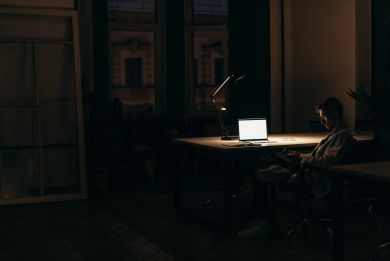The impact of Lighting on circadian systems

To understand why enlightenment affects our state of mind, as we covered in last week's article, it's also important to understand how enlightenment affects our bodies.
The human body operates according to several biological systems, one of which is the circadian system. This system uses lighting cues to regulate other systems in our body and influence processes such as the release of chemicals in the brain.
The circadian rhythm is controlled by the brain's hypothalamus. Connecting the nervous system to the endocrine system (the system responsible for hormone regulation), the hypothalamus operates through a small bundle of cells called the suprachiasmatic nucleus (SCN). The SCN is connected to the optic nerve behind the eye and receives information about the various levels of light and dark in our environment during the day and night.
When light enters your eyes first thing in the morning, the SCN responds immediately and starts its “day mode”. Signals are sent that increase your heart rate, temperature and blood pressure to wake you up and get your body moving.
These rhythms also tell our bodies to delay the release of hormones like melatonin. Melatonin is a hormone that helps induce the feeling of tiredness and promotes good quality sleep, which kicks in at the end of the day.
The human body operates according to several biological systems, one of which is the circadian system. This system uses lighting cues to regulate other systems in our body and influence processes such as the release of chemicals in the brain.
The circadian rhythm is controlled by the brain's hypothalamus. Connecting the nervous system to the endocrine system (the system responsible for hormone regulation), the hypothalamus operates through a small bundle of cells called the suprachiasmatic nucleus (SCN). The SCN is connected to the optic nerve behind the eye and receives information about the various levels of light and dark in our environment during the day and night.
When light enters your eyes first thing in the morning, the SCN responds immediately and starts its “day mode”. Signals are sent that increase your heart rate, temperature and blood pressure to wake you up and get your body moving.
These rhythms also tell our bodies to delay the release of hormones like melatonin. Melatonin is a hormone that helps induce the feeling of tiredness and promotes good quality sleep, which kicks in at the end of the day.

Unfortunately, in our 24-hour digital world, we often get light in our eyes many hours after sunset, causing our rhythms to become erratic. Before the invention of artificial light, natural periods of daylight helped regulate our biological clocks. Now that we are exposed to multiple forms of artificial light, things have changed. Artificial light affects our circadian rhythms in many ways, both positively and negatively.
We use lighting in our homes, gradually increasing or decreasing our light sources as the sun rises and sets. We use brighter lights, or task lighting, when we're active, and accent lights or dimmer lighting when we want to relax. However, both strong and weak light can have a negative impact on our lives. For example, bright lighting in the dining area can cause a lack of appetite, while dim lighting can encourage overeating.
However, the most critical aspect of our lives that is affected by lighting is the quality of our sleep. Our circadian rhythm requires periods of darkness to function properly. Ideally, at nightfall, our bodies are removed from sources of light so that our circadian rhythms and other biological systems can perform their vital functions. Unfortunately, any exposure to light during these periods disrupts our natural bodily functions.
When our sleep and rhythm cycles are disrupted, our health suffers. Did you know that something as simple as sleeping with a light on dramatically influences our health? For thousands of years, human biology has evolved to rely exclusively on the daily cycles of natural light. Artificial light has only been introduced into our daily lives in the last 150 years.
We use lighting in our homes, gradually increasing or decreasing our light sources as the sun rises and sets. We use brighter lights, or task lighting, when we're active, and accent lights or dimmer lighting when we want to relax. However, both strong and weak light can have a negative impact on our lives. For example, bright lighting in the dining area can cause a lack of appetite, while dim lighting can encourage overeating.
However, the most critical aspect of our lives that is affected by lighting is the quality of our sleep. Our circadian rhythm requires periods of darkness to function properly. Ideally, at nightfall, our bodies are removed from sources of light so that our circadian rhythms and other biological systems can perform their vital functions. Unfortunately, any exposure to light during these periods disrupts our natural bodily functions.
When our sleep and rhythm cycles are disrupted, our health suffers. Did you know that something as simple as sleeping with a light on dramatically influences our health? For thousands of years, human biology has evolved to rely exclusively on the daily cycles of natural light. Artificial light has only been introduced into our daily lives in the last 150 years.

Studies show that disrupted circadian cycles impair everything from our internal clock and organs to the basic functioning of our body at a cellular level. Health complications caused by disruptions to your circadian rhythm, ranging from irritability to diabetes or even cancer, will affect your health, well-being, mood and productivity.
People most likely to have desynchronized circadian rhythms are those who spend a lot of time indoors and who are in dim light for long periods of time. This environment is common for office workers and puts those people, who work long hours indoors without windows, at a high risk of suffering damage to their circadian rhythm.
People most likely to have desynchronized circadian rhythms are those who spend a lot of time indoors and who are in dim light for long periods of time. This environment is common for office workers and puts those people, who work long hours indoors without windows, at a high risk of suffering damage to their circadian rhythm.